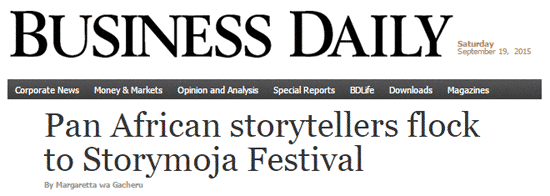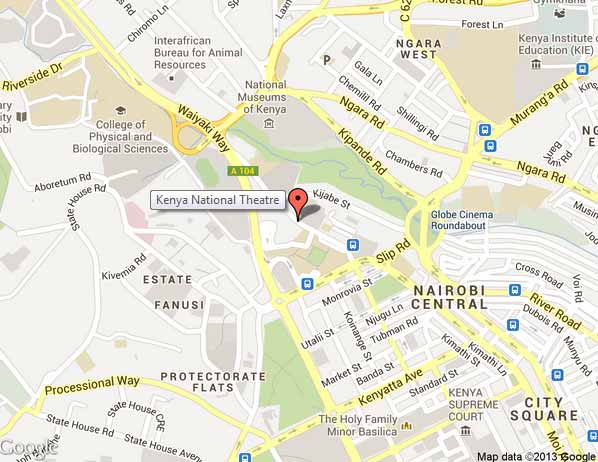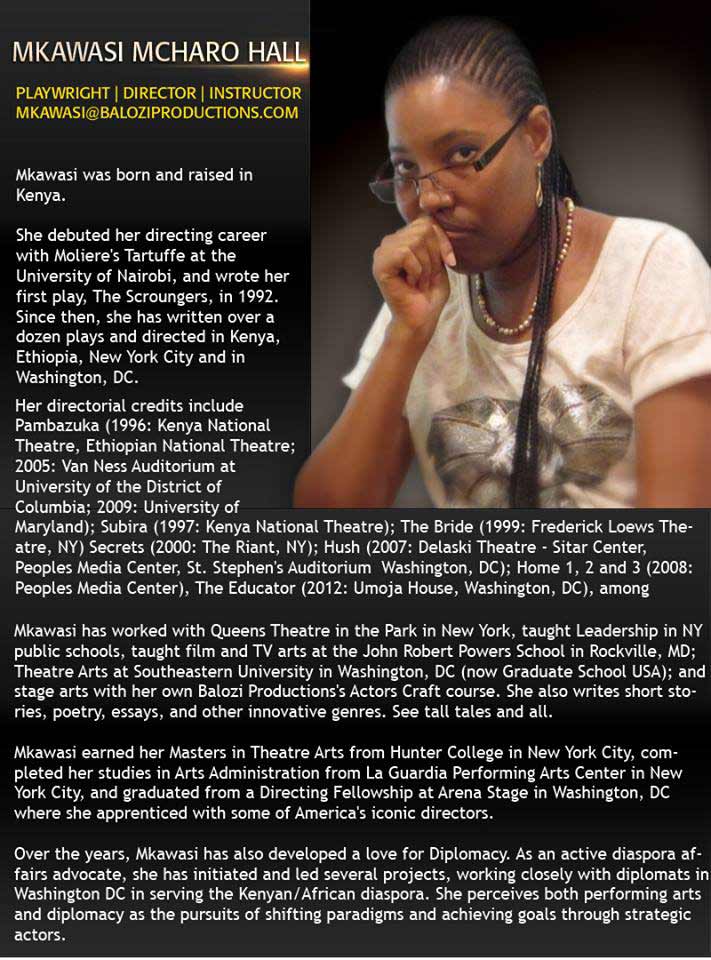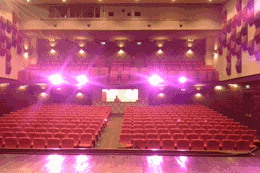

Two best friends...
...set off to find someone who does not want to be found. What is life like when there's no one there to give applause to your proudest moment, no one except the person who has rejected you? Where do children go to find their stolen childhood? PUMA is the pulse of innocence; of children who simply want to play, but alas, adults have burnt their playgrounds and muted their play-songs.
PUMA is NOT
recommended for children
- Playing: PUMA
-

Venue:
Kenya National Theatre -
Days & Times:
-
Nov 20th - 22nd
Nov 27th - 29th
Dec 4th - 6th -
Fri Dec 4th 6:30pm
Sat Dec 5th 2pm
Sun Dec 6th 6:30pm
-
Premier Night:
Fri Nov 20th 6:30pm
-
-
Tickets:
-
Advance Tickets: 1000/=
Gate Tickets: 1200/=
-
- Follow @Pumatheplay
-
-
"I Promise"
-


Excerpt from Business Daily [Kenya] 19 Sep 2015 Web
Meanwhile, the honour of staging the premiere performance at the newly renovated Kenya National Theatre went to the long-lost Kenyan playwright-producer Mkawasi Mcharo-Hall, who organised a read-through of her new play, Puma, with almost a score of mostly Kenyatta University theatre students and a small audience of invited guests.
Puma’s performance wasn’t so much a premiere as being illustrative of the limitless ways we hope the newly remodeled theatre will be used — by serious artists who want to make authentic contributions to the advancement of Kenyan theatrical, musical, comedic and intellectual culture.
Mkawasi hasn’t been on stage, or even backstage, in Kenya for at least 20 years. Having gone to the US to study theatre arts in the 1990s, she stayed on to teach and stage shows.
Currently based in Washington DC, she’s been working on her latest script for some time and felt compelled to come home and get fresh input from Kenyans, which she got in buckets last Thursday night. An open-ended discussion, led by Dr Mshai Mwangola, revealed just how insightful, articulate and committed young Kenyan thespians are to speaking frankly about ambitious multimedia productions like Puma.
Mkawasi was brave to open herself to fellow thespians. A number of them asked if she wasn’t being too ambitious in trying to tackle so many elements of Kenyan history all at once.
For me, her ambition was laudable, especially because she is one of the few local playwrights who clearly sees the theatrical value and substantial content that unfolds every day in the country. She draws upon real life experiences of a wide cross section of Kenyans.
Some critics claimed it was the charcoal dealer mama whose character stole the show. Puma is scheduled to have a world-premiere in early December at the Kenya National Theatre. Auditions are to begin this coming week so contact the Kenya Cultural Centre for details.
Tickets
You may purchase tickets at the Kenya National Theatre box office. E-ticketing available soon.

'It's like serving chips for breakfast, lunch and diner all year round'
Excerpt from THE NAIROBIAN [Kenya] 9-15 Oct 2015
BY SHIRLEY GENGA
Mkawasi Mcharo Hall made her directorial debut with Moliere's Tartuffe at the University of Nairobi, and proceeded to write her first play, The Scroungers, in 1992.
Since then, she has been an unstoppable force of nature in the theatre world. With an impressive career spanning 22 years, she has written and directed plays in Kenya, Ethiopia, New York City and Washington, DC.
Now, Mkawasi, who currently resides in the US and runs Balozi Productions with her husband, is back in town to whet the appetites of theatre aficionados with a new production, Puma, the first full-month run production premiering at the newly renovated Kenya National Theatre.
The play done in collaboration with Kenyatta University's School of Visual and Performing Arts, revolves around two best friends who set off to find someone who does not want to be found.
"Puma is Kiswahili for 'pulse' and that is why the play asks pertinent questions about life. What is life like when there's no one there to give applause to your proudest moment, no one except the person who has rejected you? Where do children go to find their stolen childhood? Puma is the pulse of innocence of children who simply want to play, but alas, adults have burnt their playgrounds and muted their play songs. It is a story about innocence and treachery, and rejection and redemption, destruction and and rebuilding, remembrance and reminding. It's the pulse of a nation on the verge of ruin or recovery. It is a play with music and dance," says Mkawasi.
but alas, adults have burnt their playgrounds and muted their play songs. It is a story about innocence and treachery, and rejection and redemption, destruction and and rebuilding, remembrance and reminding. It's the pulse of a nation on the verge of ruin or recovery. It is a play with music and dance," says Mkawasi.
She has been in town for a month preparing for the play set from November 10 through December 10.
"I hit the ground running as I have very little time before opening night. I sought advice from those have been in the industry since I left, and I managed to get the casting call broadcast on various artist groups. We had a turnout of about 100, out of which we got our main cast of 13 who include: Gilbert Lukalia, James Webbo, Eric Wanyama, Lenahliz Kamunzyu, Kevin Gathuo, Demisha Barassa and Janet Bulinga. We have ended up with a great cast. Those guys in the Puma cast are about to blow your minds; Kenyan actors are coming to age!"
When asked about the difference between the theatre scene in Kenya now and back in the 90s, she states, "I think back then there was a sense of seriousness, almost a response to a call-of-the-gods for those who engaged in the theatre during my time. These were mostly products of restless thinkers and creative experimenters from the University of Nairobi and Kenyatta. There was a lot of intellectual thought that was put in the exploration of a script, production process, and even post-production discussions that went on ad infinitum. It was almost a renaissance that died a premature death."
Compared to the US, "Kenya's theatre scene is much smaller. And that's a great advantage to those who want to be at the core of setting its foundation. This is the time to make a name, make history. Most of what is served, from my observation, is 'fast-food' theatre: Comedy and melodrama that one enjoys thoroughly for the moment and soon forgets; scripts that are improvised quickly for a quick buck. This is a welcome genre in the industry, but it should not be the only genre. It's like serving chips for breakfast, lunch and dinner all year round."
However, she reiterates that there is hope in the industry, potential renaissance in the works.
"In the long run, I hope Puma will mark the transition period for theatre artist and the Kenya National Theatre, from the 'Shrine of Tears' Mwalimu Imbuga lamented about to a shrine of rebirths. A 'Shrinaissance' era so to speak. An era of prolific writing, quality mind-blowing stories, stagecraft and creative techniques that will set a trend for an industry that will go down in history an Kenya's cultural rebirth. I hope Puma will ba a small seed in the theatre district that is yet to come all along Harry Thuku Road, vibrant and teeming with restless minds. This has already started happening, thanks to those who pushed for and oversaw the renovations of this space. Some gave up their practice as artists to become policy-pushers so we could have this space. We owe them a debt of gratitude."
Mkawasi has a long list of plays under her belt.
Among the productions she has been involved in include; Pambazuka (1996; Kenya National Theatre, Ethiopian National Theatre, 2005; Van Ness Auditorium at University of the District of Columbia; 2009; University of Maryland); Subira (1997; Kenya National Theatre); The Bride (1999; Frederick Loews Theatre, NY); Secrets (2000; The Riant, NY); Hush (2007; Delaski Theatre - Sitar Center, Peoples Media Center, St. Stephen's Auditorium - Washington, DC); Home 1, 2 and 3 (2008; Peoples Media Center), and The Educator (2012; Umoja House, Washington, DC).
FROM THE PRODUCER:
One of our best practice is working in partnership with college students.
The playwright's original material has been used for study and/or produced in partnership with individual professors, departments and student associations that include Hunter College (NY), University of District of Columbia (DC) and University of Maryland (MD).
The playwright's first college partnership was with students from Addis Ababa University, Ethiopia, in 1997. We are proud and excited to partner with Kenyatta University's School of Visual and Performing Arts towards the production of PUMA.
We look forward to working with KU students and professors and sharing what knowledge we have in the magical, intrusive and dangerous art of theatre. Storytelling is not for the faint of heart.
The playwright also has a history with the Kenya National Theatre, having written and directed two plays there almost 20 years ago; Pambazuka, 1996 (co-writer) and Subira, 1997.
-
"Theme Song"
Theme Song & I Promise
Composed by Gabriel Omondi
Lyrics by Mkawasi Mcharo Hall
She has taught, written plays and directed on stage for 22 years and counting. PUMA is her latest play.
Preston Hall, Producer

SYNOPSIS:
-
The clock is ticking. She cannot run anymore. Tunu's 9-year old body is weakened by illness. Her breath is laboured. Her pulse is erratic. She has a critical appointment to sing. A stranger comes to her aid as she lies by the roadside unable to catch up with the rest of the choir. She reminds him of his own daughter. As he waits on the doctors to save Tunu's life, the stranger's own life explodes in our face through a pulsation of impossible memories. In Tunu's mind, the world is still waiting to hear her sing. She awaits her applause. The stranger awaits his healing.
-
PUMA is a story about innocence and treachery, rejection and redemption, destruction and rebuilding, remembrance and remending. It's the pulse of a nation on the verge ruin or recovery.
'Puma' (Swahili for pulse - "kupandwa na puma" - the quickening of breath, the rising of pulse).
PARTNERS:
![]() tictocmind.com (c)2015-16 PUMA
tictocmind.com (c)2015-16 PUMA










